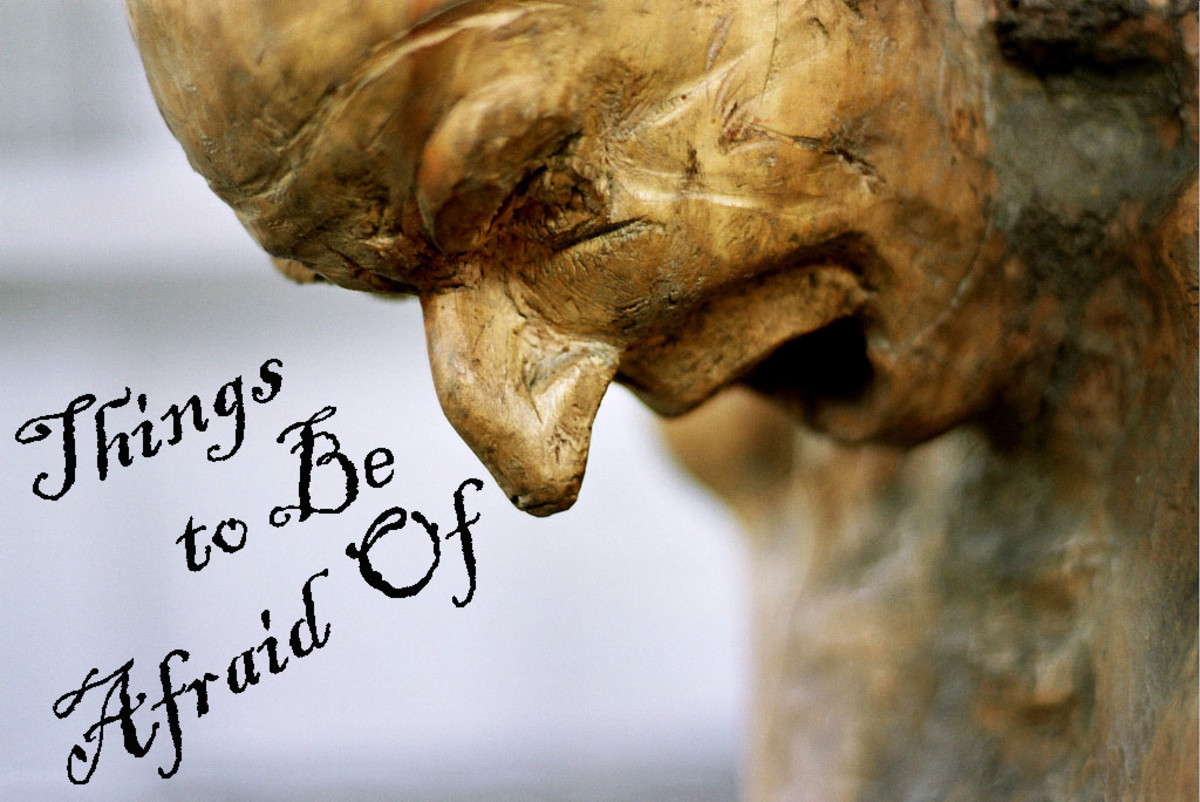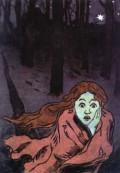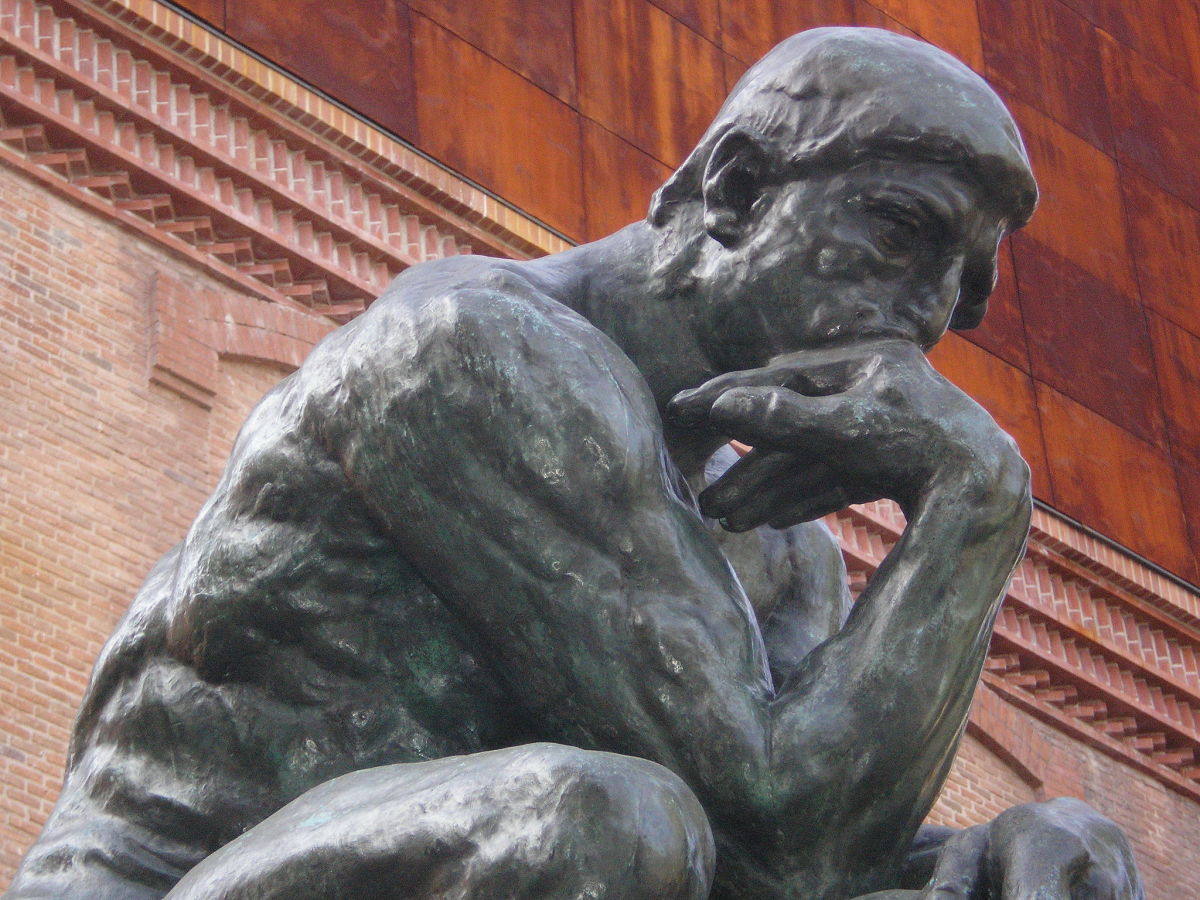Inspirational and Insightful Quotations #63 --- Fear
Quotations on Fear
Fear is the great enemy of mankind.
It is not death which is the Great Deceiver. It is fear which hovers over humanity, spreads its skeleton hands and grins from its toothless skull.
Fear makes our hearts beat overtime, dries up the moisture of the body, makes the mouth sticky and the tongue click.
Fear tightens the muscles into spasms, stretches the nerves and keeps us awake at night.
Fear has its place in self-preservation.
If we had no fear, many of us would be destroyed much sooner than we are.
But it was never intended in the scheme of things that humanity should be dominated by fear as it is.
Fear drives whole nations insane and makes them do the craziest things.
It is fear which makes the nations arm, renders them suspicious, ferments hate in their hearts.
—Burris A. Jenkins, Kansas City Post, Kansas City, Mo., Dec. 10, 1919.
[Are we] afraid of things that never come to pass, afraid of dangers that do not really impend, crossing rivers before we get to them, that never will bar our progress, afraid of a tomorrow which, after all, dawns sunny and bright; afraid of a thousand things that never do happen and cannot hurt us?
Fear is usually the result of ignorance.
Most of the things that the savage in the forest is afraid of are things which he does not know and understand.
He is afraid of spirits which do not exist, of devils conjured up by his own imagination. He is afraid of other tribes because he does not know them. He is afraid of a strange sound because he has never heard it before. If he should see a watch, he would be deathly afraid of it because it moved and seemed alive. ...
It is the unknown which frightens us. It is ignorance which lies at the root of so much of our folly and our fears.
—Burris A. Jenkins, Kansas City Post, Kansas City, Mo., Dec. 11, 1919.
[There is] the tendency of humanity, when it has nothing else to fear, to conjure up imaginary things.
The religions of fear with which the world has burdened itself, warped and twisted life and crippled its energies, are the things we would protest against.
What is the use of anticipating hells when there are hells enough in existence?
What is the use of piling imagined hells on top of real ones?
Let us endure the ills we have, rather than fly to others that we know not of.
—Burris A. Jenkins, Kansas City Post, Kansas City, Mo., Dec. 14, 1919.
Ignorance is the mother of fear.
—Burris A. Jenkins, Kansas City Post, Kansas City, Mo., Nov. 26, 1920.
Abolish fear and you can accomplish whatever you can.
—Elbert Hubbard, quoted in Deseret Evening News, Salt Lake City, Utah, July 29, 1905.
Too many men view life through the telescopes of fear and pessimism. They see trouble ahead, but none of the beauties at the side of the road close by. Then when they get to the mountains of trouble and find the molehills, they are disappointed and peer anxiously through their telescopes for dire disturbance further on.
—W.A. MacKenzie, Florida Times-Union, Jacksonville, Fla., Feb. 13, 1923.
Fears are goblins of the dark which melt in the morning sun of true discernment.
—W.A. MacKenzie, Florida Times-Union, Jacksonville, Fla., April 16, 1923.
Fear is astigmatism of understanding.
—W.A. MacKenzie, The Leesburg Morning Commercial, Leesburg, Fla., March 1, 1927.
Men spend much energy building dungeons to house their fears of things that never happen.
—W.A. MacKenzie, The Leesburg Morning Commercial, Leesburg, Fla., March 26, 1927.
It is doubtful that any of us are free from fear. There are different kinds of fear, however. The following classifications are synonyms with fear and are found in the dictionary: dread, fright, alarm, dismay, consternation, panic, terror, horror, trepidation.
Fear and dread both imply apprehension and anxiety and, often, a complete loss of courage; fright, the shock of sudden, startling fear; alarm, the fright that comes from awareness of danger; dismay implies deprivation of courage or spirit by an alarming or disconcerting prospect; consternation, the prostration or confusion of one's faculties; panic stresses overmastering, and, often, groundless fear or fright; terror, extreme consternation; horror, a shuddering fear mixed with abhorrence at something seen; trepidation adds to dread the implications of timidity and, often, trembling and hesitation.
They are all descriptions grim and depressing. The foregoing are all physical or mental aspects of the word fear.
When we are fearful, or hear the word used, it not frequently follows that we think of the word courage. It is said that "courage is not the absence of fear, it is the conquest of it."
There is a great difference between abject fear and a sense of timidity and shyness which afflicts so many people. As a matter of fact, most individuals of this nature are fearless as we use that term, in situations which require great physical and moral courage. Nevertheless, they are terrified if called upon to make a speech in public.
—L. Garrett Myers, Fishers of Men, Hamburg, West Germany, October 1965.
A challenge connotates a dare, an invitation, a goal and strong faith on the part of the challenger. If a person is going to make a challenge, he must have courage, an interest in the subject of challenge, a purpose for the challenging, and some knowledge of the possible outcome. People are not born with these qualities, they must be developed. The degree to which they are developed depends on our experiences and desires.
Webster's Dictionary says that fear is a painful emotion. We are aware that emotions can get out of hand. Fear is not altogether a bad emotion. Without it we might lack good judgment. Fear is the brake that keeps us from doing things without thought. On the other hand, we cannot progress or even get started if the brakes are on too tight. We must learn to release the brake when the road is clear to travel.
If we look into the reasons for fear, we will find that lack of knowledge is the greatest contributor. We fear few things in life that we understand thoroughly.
—Wallace H. Prigmore, Affirmative, Billings, Mont., April 1967.
Fear is by all odds the greatest scourge of existence--the greatest woe breeder of all time. For fear is the wrecker of both heart and soul and the destroyer of peace. The man without fear lives an unbeaten life and dies but one death.
—Grantland Rice, New York Tribune, New York, N.Y., March 3, 1915.
Fear is one of the greatest of all stymies in any sport–or along any road of existence. Yet in the vast majority of cases the dire results anticipated or feared are not nearly so painful and depressing as they once looked to be.
Fear is undoubtedly one of the great wreckers in sport. Why is it that so many golfers play their poorest strokes in front of a pond or deep trap? Fear of getting in kills off any decisive action. They are no longer concentrating upon hitting the ball. Their minds are mainly taken up with the thought of trouble ahead, of the dire result that a mistake or error will bring about. In place of concentrating on the proper stroke, they are permitting fear to eat into their confidence, to take all rhythm and snap from the punch.
The man who can conquer fear has a long start along the road that leads somewhere. The man who can't might as well retire.
—Grantland Rice, New York Tribune, New York, N.Y., Aug. 2, 1923.
Fear is a most deadly enemy to humanity. Fear can end life for us long before death catches up to us. ... Have you ever felt that there were so many things needing to be done, things you would love to do, but fear of failure stopped you from even trying? ... There could be no greater failure in life than the failure to even try to allow ourselves to be defeated. To be defeated in mind is the worst of all failures, because in so doing we never even experience the joy of beginnings, not to mention the thrill of success.
—Bob D. Orr, Searcy Daily Citizen, Searcy, Ark., Aug. 22, 1980.
Most people have inhibitions and fears that tend to keep them from doing what they know they should do.
Now is the time to break the bands. Success demands that you become the master of your emotions. This is done by courageously doing each task as it presents itself, by doing today’s work today. It is surprising how disagreeable some tasks appear and how pleasant they become when started.
It doesn’t pay to dodge an issue, for eventually it must be faced. An obligation is not fulfilled by putting its solution off until another day. Most of the misery and tragedy that comes into the lives of human beings is the result of their attempts to circumvent life’s issues rather than face them. Most of the peace and happiness of life results from great accomplishment which in turn results from fearlessly meeting each problem of life without delay.
—Lee A. Palmer, Improvement Era, Salt Lake City, Utah, August 1952.
Fear is the essence of poor character. It knocks down courage and sometimes picks up deceit.
—Lyman Kearns, Utah Chronicle, Salt Lake City, Utah, June 16, 1947.
The worse enemy of mankind is fear, which limits abilities, threatens potentialities and is a thief of happiness.
—Richard Lynch, New York Times, New York, N.Y., Nov. 7, 1927.
Fear of ridicule keeps many a man in the old ruts.
—Bert Moses, Lake Charles American Press, Lake Charles, La., May 5, 1941.
We are afraid of something as long as we think it can hurt us. Once we are convinced there is no danger, our fear will go.
Without fear in its milder forms: caution, foresight, etc., we would not long survive. Every life has its moments of danger. But the best procedure at such times is to analyze the risks involved and then to decide on how they can be cut to a minimum. Dwelling on lurid details either causes alarm or increases the fascination which danger can sometimes possess. Often the fear of a particular experience can do more harm than the experience itself. The parents of a boy who had been ill as a child had him lead a sheltered life thereafter, though medically this was not necessary. As a man, his countless fears did him more danger than could have been caused by any activity.
Some older people may not be very helpful about the prospect awaiting boys and girls in general, or they may think a particular individual lacking in some quality essential to success. However, for a young person to hear constantly that failure is just around the corner, often leads to a great fear of the future in him. He may hesitate to attempt anything, a condition often called laziness in error. Fear is probably the chief factor which prevents boys and girls from making the most of their intelligence. A typical case is the student who knows the right answer but is unwilling to recite.
Behind every fear is a story and behind the story is a person. Some fears are cleared up when we recall the incident which caused it. That is why it is so important to discuss our fears with a sympathetic listener.
Yet sometimes a fear persists, despite everything one can do. We then must accept it as another fact about ourselves, in the same class as our height, age, etc. To fear one's fear is only doubling trouble. A brave man is not one without fear, but one who faces his fear when that is the thing to do. A high school girl afraid of snakes handled and killed one in order to rescue a little child.
Among the most damaging of fears is one which really is an entire pattern of living In order to shut out pain and trouble, a person tries to shut out the world as well. But one should go out to welcome all the items in a changing experience, even those which bring suffering, since it is chiefly from this that we keep on developing emotionally.
Fear is the chief cause of the difficulties which crop up in the relationships of individuals and of nations. It is the chief cause of human unhappiness. A country could set itself no higher goal than to discover and eliminate those aspects of its social and economic life which breed fear in its citizens.
—George Lawton, Scholastic, New York, N.Y., Oct. 28, 1940.
Fear is a yoke around the neck of many. It becomes unreasonable when it adds the memories of yesterday to the anxieties of tomorrow.
—Chris John Westhof, Tulia Herald, Tulia, Texas, Dec. 29, 1955.
Fear has defeated more men than actual trouble has.
—Roy L. Smith, Christian Advocate, Chicago, Ill., Sept. 14, 1944.
Fear is a tyrant that makes men slaves to their worst.
—Roy L. Smith, Tampa Morning Tribune, Tampa, Fla., Feb. 18, 1930.
Fear is the beginning of cowardice.
—Roy L. Smith, Tampa Morning Tribune, Tampa, Fla., Feb. 18, 1930.
It often happens that our difficulties are not half as bad as our fears.
—Roy L. Smith, Tampa Morning Tribune, Tampa, Fla., May 13, 1933.
The man who lives in fear makes his own prison.
—Roy L. Smith, Tampa Morning Tribune, Tampa, Fla., June 24, 1933.








